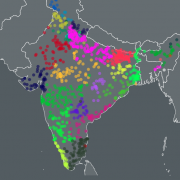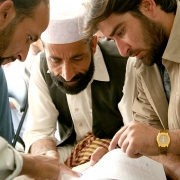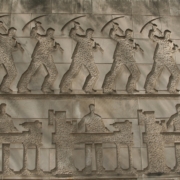Looking Forward to 2021. May It Be Better than 2020
Some platform reminded me I started Quirk Global Strategies in Istanbul 14 years ago this week. Looking back, the process that led to that decision could generously be described as “ad hoc.” As it turns out, I didn’t have “a year-long travel shutdown and projects shelved because of a virus” in the threat assessment I didn’t make. While I am thankful that the year wasn’t as catastrophic as it could have been, I hope to rise out of a defensive crouch in 2021.
Above all else, the disruption of 2020 showed me that the hands-on work I do in the field is the foundational value I provide my clients. All my clients benefit from the context I gain in the field and the problem-solving skills I develop. Here are few of the other things I’ve learned.
Polls Still Work
When I hear someone say “polls don’t work,” I look at them with the same degree of respect as I do someone who says “the earth is flat.” Survey research is based on the science of statistics, the principles of which are well-established. Nothing has changed. Furthermore, polls are a tool. You wouldn’t say “hammers don’t work,” unless you’re trying to hammer a screw. In that case you’d be right and you’d be better off trying a screwdriver.

I don’t know if this image belongs to Jason Boxt of 3W Insights, but that’s who I took it from.
For a variety of complicated reasons, probability sampling by telephone has become a less useful tool for some purposes in some places. One purpose that everyone has opinions about is measuring vote intentions of the polarized, diverse US electorate. But that’s not the purpose of most survey research. I have lots of problems with data collection in places I work, but the challenges facing US pollsters are not among them (btw the public pollsters did pretty well in the recent special Senate election in Georgia). Those of us who do strategic research can keep hammering away at nails with reasonable confidence that, as long as we keep a sharp eye on quality control and COVID-related obstacles, our data and the conclusions we draw from it are sound.
Telephone Interviews Continue to Replace Face-to-Face
Interviews once done face-to-face are increasingly being conducted on mobile phones via CATI. In the short run, I still have reservations about the representativeness of phone samples from many Eurasian, African and Middle Eastern countries. However, in the long run, this a positive development. Data collection will be faster, easier to monitor and, once mobile penetration is evenly distributed, might even be more representative than face-to-face samples in some places. Additionally, telephone interviews require shorter, simpler questionnaires. This will result in better quality data. Hearing poorly educated, busy respondents trying their best to power through a 50 minute face-to-face questionnaire on constitutional reform in pre-tests is shame-inducing. With phone interviews, respondents can give their opinion on a bad questionnaire by hanging up.
Online Qualitative Is Terrible
There, I said it. We can’t just stop doing qualitative research because in-person groups are impossible. Unfortunately, Zoom is the only option we have right now. I’ve learned ways to mitigate its shortcomings. But we shouldn’t for one minute forget what we’re losing when we collect five or six people for a discussion that looks and sounds like Hollywood Squares. So much quality data get left on the table! It actually pains me.
Everyone knows group dynamics can undermine qualitative research. Now that it works differently, I’ve seen how group dynamics can also be the brightest illuminator. I miss it. Zoom participants tend respond to the moderator rather than the person sitting across from them. The result is a lot of “going around the table,” which I hate. I miss seeing reactions of discomfort or alarm or enthusiasm to a fellow participant’s comment, particularly on a sensitive topic. Additionally, being able to google the answer distorts participants’ perceptions, making them appear more engaged or more knowledgeable than they are, especially on politics. Bored online participants have a thousand distractions right in front of them that they don’t have when sitting around a table together. Shorter groups with fewer participants mean less time for depth and breadth, less opportunity for that lightning bolt to strike when an engaged group generates useful ideas.
I miss out, too, as an analyst. Of course it’s possible to listen to groups via a video or audio link. I’ve done it many times when it’s too dangerous to travel or when observer facilities are improvised. But I miss the dynamic of the “back room” where I can check and crosscheck ideas with my local colleagues and moderators. I miss hearing them react to participants’ thoughts and the context they give. They make me a better analyst and project designer.
In-depth Interviews Work Well Online
Here’s one positive thing I’ve learned. Online platforms like Zoom facilitate near-simultaneous translation. This has made it easier for me to personally conduct in-depth interviews with non-English speakers. I wouldn’t do it for all projects. But for program assessments or KIIs, I can dig more deeply and formulate follow-ups that synthesize what I’ve heard respondents tell me. It’s also fun to interact with new and interesting people while I am isolated at home.
Relationships Matter

I recognize that waiting out a pandemic in the Côte d’Azur does not engender much sympathy
I received an email from a colleague in Georgia thanking me for a referral. He lamented the current situation and let me know that his firm has managed to hang on. I appreciated hearing the update. Having spent 14 years building these relationships, I miss them. I’ve skipped my usual trips to Washington, New York and London. The blocks of time I would have spent in Ukraine, Bangladesh, Iraq or Turkey I’ve instead spent in my apartment, staring at my monitor. The isolation has been one of the hardest parts of the last year. My clients and partners are my friends and are the best part of my job. Listening, having meals and drinks and sharing long car rides with them ground my insights in real life. Zoom can’t replace this loss.
As soon as I am vaccinated, I’ll get back on the horse. I’m looking forward to seeing as many of you out there as possible. Contact me if you’re looking for help navigating this complicated new world. Wishing everyone a more engaging, more productive 2021.









